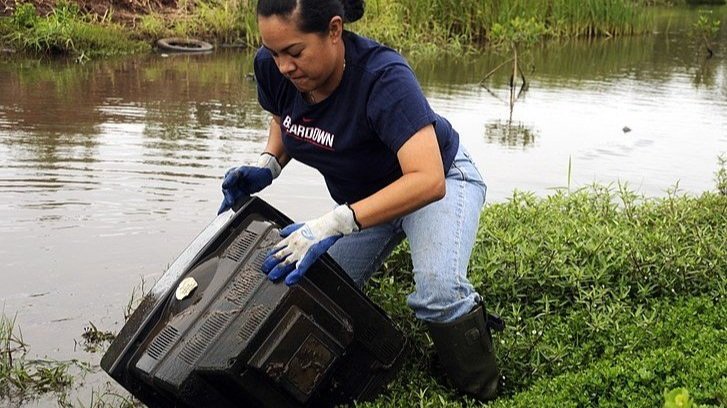Brookings pastor Carl Kline: My dad was right. Unplug the TV and devices. Enjoy the amazing world around you
When I was growing up, there was no TV in our house. It only became available to the public in 1938 and my father was not impressed. To him, it was one of those new fangled inventions that would only lead to poorer human habits and interactions.
Why would someone sit around watching a snowy screen when they could be working? Laziness, was his answer! Besides, there didn’t seem to be anything edifying or educational offered anyway.
For many years my siblings and I would catch a program or two at a friend’s house. We didn’t broadcast those stolen moments at home, where we felt like we were suffering serious deprivation. We knew the phrase, “all the other kids!” As I got older, I don’t recall missing TV. There were so many things to do and so much going on, there wasn’t screen time anyway.
When my wife and I went to Seminary in New York City, we lived in housing with other newly married students. Couples were on the first floor with single male students on the two upper floors. On our first evening there, we discovered that everyone would crowd into the small TV room for the evening news.
Imagine our surprise when the birth of the Fischer Quintuplets from Aberdeen, (our hometown) made the national news. And imagine how we felt as several of the citified folk joked about the Fischer farmstead and rural life. Our first full day in the Big Apple and our hometown was with us on television.
With my first employment after graduate school we purchased a TV set. We lived in a small three-room apartment with our first child. Fortunately, the apartment building had an antenna we could access and didn’t have to mess with “rabbit ears.” Those were miniature antennas you would set on top of the TV to try and catch a signal. They required continuing adjustment, often without much success. Even antennas in those days could be problematic. Some could be rotated to try and better the picture.
I almost destroyed that first TV (in much the same spirit that the woman above is handling a wrecked set in a public domain photo posted on wikimedia commons). We happened to have it on when the news came that Bobby Kennedy had been shot and killed. I had some metal object in my hand at the time and I was so angry I threw it at the TV set. Fortunately, I missed. It would have shattered the screen.
Having stood in line in Washington, D.C. for hours to walk by his brother Jack, lying in state after his assassination, a second family murder was simply too much. I lost it!
A visit to India reminded me of the Seminary TV room. Television had only recently arrived in a rural area where we were staying. “The Mahabharata,” an ancient Hindu epic, was playing. One home in the village had a television. How it was possible to fit half the village inside, and outside, that home was beyond me. It seemed as if multiple eyes filled the windows, as people crouched and leaned and stretched outside, in order to see over the multiple bodies on the floor inside.
These days our television sits quietly during the day. The only exception is an occasional sporting event on the weekend. Most days, it gets turned on for the evening news, “Wheel of Fortune” and whatever of interest that might follow. Often, if there’s nothing of interest, it offers quiet background music.
It’s curious how when cable television was first advertised, we were led to believe purchasing it would relieve us from all the commercials. The company would get their return from our purchase and would not need the revenue from ads. How wrong we were. The ads get more numerous and longer. Watching the evening news, it’s possible to know the “tour Nebraska” ad by heart. And I’ll always use Colgate toothpaste because of the “invisible shield” ad that stopped a baseball from hitting me in the head.
I usually manage to ignore, or tolerate, the lengthy ads toward the end of the newscast, as I would like to see the “human interest,” “feel good” story at the end. After what is usually depressing news of the day, one wants something uplifting for a change. It makes dinnertime more palatable.
Heaven only knows what’s next! If you wish, you can have a TV screen large enough for your wall, with a picture as clear or clearer than being present in person. Or, you can watch a football game on your smartphone. No rabbit ears. No antenna. No plug in. It’s all right there at the push of a button on the remote or a scroll on the screen.
I’m afraid I’m becoming more like my father. Less screen time means more time for human and natural interaction. Dinner with friends is better than the evening news. A walk at the Nature Park can replace “Wheel of Fortune.”
The less screen time, the more engaged time in the world around us.
Carl Kline of Brookings is a United Church of Christ clergyman and adjunct faculty member at the Mt. Marty College campus in Watertown. He is a founder and on the planning committee of the Brookings Interfaith Council, co-founder of Nonviolent Alternatives, a small not-for-profit that, for 15 years, provided intercultural experiences with Lakota/Dakota people in the Northern Plains and brought conflict resolution and peer mediation programs to schools around the region. He was one of the early participants in the development of Peace Brigades International. Kline can be reached at carl@satyagrahainstitute.org. This column originally appeared in the Brookings Register.







